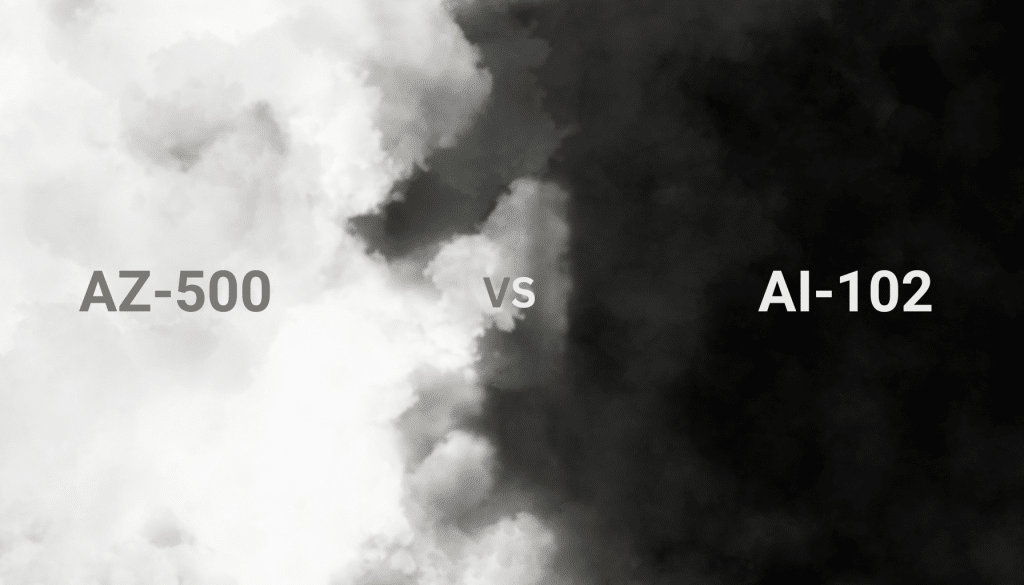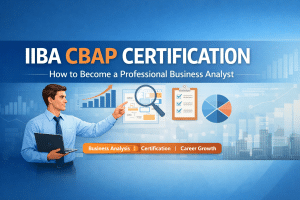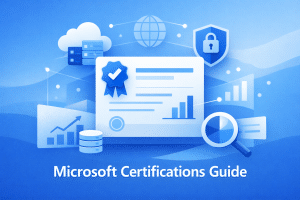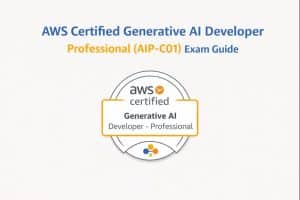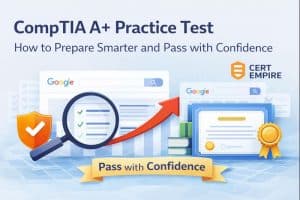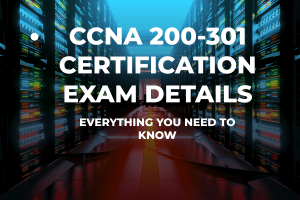Choosing between AZ-500 and AI-102 can be confusing, especially if you’re working with cloud security or AI technologies. Both certifications focus on Microsoft Azure, but they serve very different career paths.
If you’re into protecting cloud environments, preventing cyber threats, and managing security policies, AZ-500 might be the right choice. But if you’re more interested in building AI-driven applications, integrating machine learning, and working with Azure AI services, AI-102 is the way to go.
So, which one is better for AI professionals? Let’s break it down and see which certification makes the most sense for your career goals.
Comparison
| Feature | AZ-500 (Microsoft Azure Security Technologies) | AI-102 (Designing and Implementing an Azure AI Solution) |
| Target Audience | Security professionals, security engineers | AI engineers, developers, data scientists |
| Focus Area | Security, threat protection, identity & access management | Designing and implementing AI solutions on Azure |
| Prerequisites | Basic knowledge of Azure security, networking, and identity management | Basic knowledge of AI, machine learning, and Azure AI services |
| Exam Cost | $165 USD | $165 USD |
| Difficulty Level | Intermediate to Advanced | Intermediate |
| Skills Measured | – Identity and access management- Security operations- Data protection and encryption- Network security and compliance | – Planning and managing Azure AI solutions- Implementing computer vision and natural language processing solutions- Integrating AI models into applications- Managing AI-related security, compliance, and governance |
| Ideal for | Security engineers, IT security professionals, SOC analysts | AI engineers, developers, machine learning professionals |
| Job Roles | Azure Security Engineer, Security Administrator, SOC Analyst, Azure security engineer associate, Azure data scientist associate, Azure developer associate, Azure solutions architect expert, Azure administrator associate. | AI Engineer, AI Developer, Data Scientist |
| Certification Validity | 1 year | 1 year |
| Renewal Requirement | Free renewal exam every year | Free renewal exam every year |
AZ-500: Microsoft Certified Azure Security Technologies
AZ-500 is for those who want to secure cloud environments and stop threats before they cause damage. It’s not about building applications or training AI models, it’s about making sure the systems running them stay protected.
This cert is for security engineers, cloud security analysts, and IT pros who handle Azure security operations. If you’re thinking about working in cybersecurity within the Microsoft cloud ecosystem, Azure services is where you start. If you’re looking for a complete breakdown of this cert, including domains, prep tips, and career outcomes, check out our AZ-500 Certification Guide
What You’ll Learn with AZ-500
This Azure certification covers every major security aspect of Azure fundamentals. You’ll deal with:
- Identity and Access Management – Setting up role-based access control (RBAC), managing identities with Azure Active Directory (Azure AD), and making sure users only have access to what they actually need.
- Security Controls & Threat Protection – Configuring firewalls, network security groups (NSGs), and Azure DDoS Protection to keep attackers out.
- Data and Storage Security – Encrypting sensitive data, securing Azure SQL databases, and ensuring proper key management with Azure Key Vault.
- Monitoring and Security Response – Using Microsoft Defender for Cloud and Azure Sentinel to track threats, analyze risks, and respond to incidents before they escalate.
- Compliance and Governance – Making sure Azure environments follow industry security standards and regulations like GDPR, ISO 27001, and NIST.
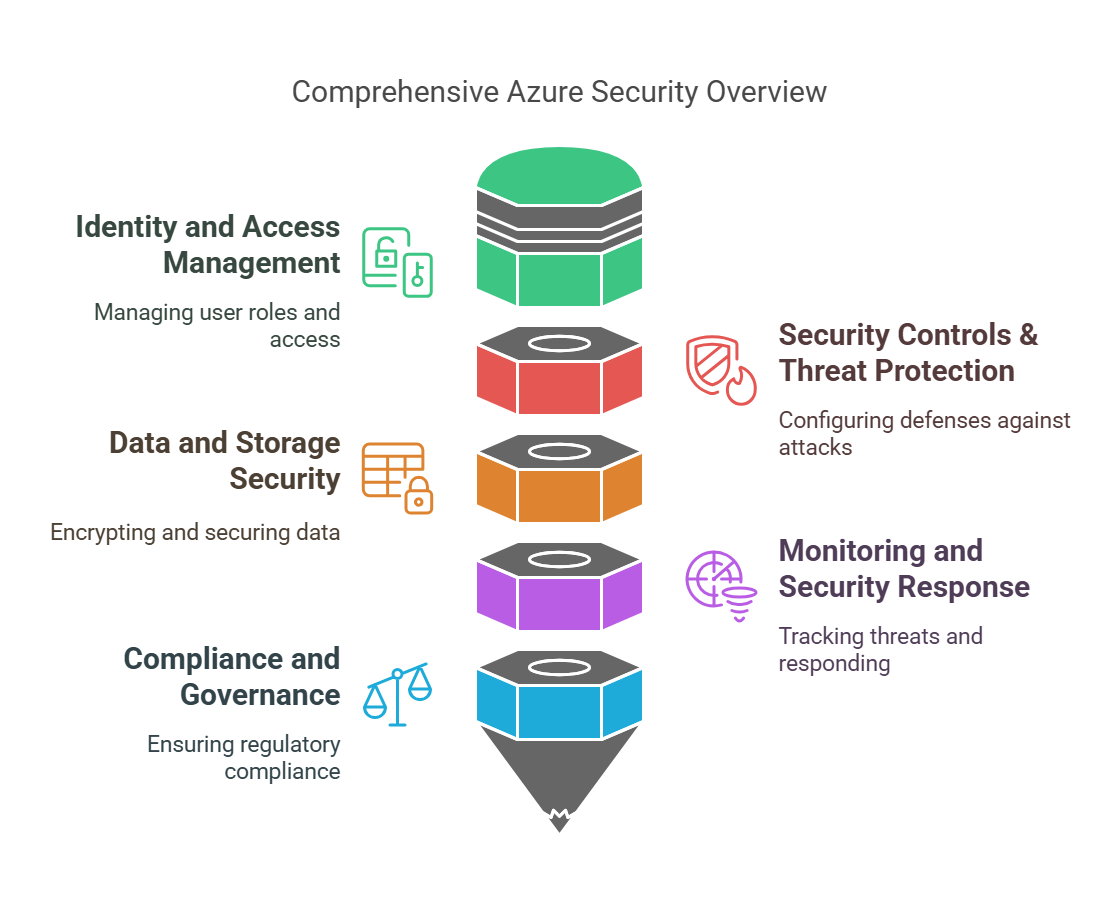
Who Should Get AZ-500?
If you’re already working in IT security or want to specialize in cloud security, this cert makes sense. It’s a good fit for cloud and hybrid environments:
- Cloud security engineers – The ones setting up security controls, handling policies, and defending cloud systems.
- Security analysts – Monitoring systems for vulnerabilities and responding to incidents.
- Azure administrators – Those managing cloud workloads who need to strengthen their security skills.
This cert isn’t for AI engineers, data scientists, or app developers, it’s for people who secure cloud environments, not build AI models. It is an Azure developer associate certification.
Why AZ-500 Matters in Today’s Tech World
Cyber threats are growing, and companies need security professionals who understand cloud platforms. If you’ve been working in on-prem IT security, AZ-500 helps you transition to cloud security roles. It proves you know how to handle security in Azure, which is a major plus since Azure is one of the top cloud platforms used by enterprises.
The Bottom Line
AZ-500 is a must-have if you want to work in Azure security. It’s not about AI, development, or cloud architecture, it’s all about defense, protection, and securing cloud infrastructure with Azure networking solutions and Azure data services.
AI-102: Designing and Implementing an Azure AI Solution
AI-102 is a completely different path. While AZ-500 focuses on security, AI-102 is about building and deploying AI solutions in Azure. This cert is for AI engineers, developers, and data scientists who want to create AI-driven applications.
What You’ll Learn with AI-102
AI-102 covers how to design, implement, and integrate AI models into cloud applications. You’ll work with:
- Azure AI Services – Using Azure Cognitive Services to add AI capabilities like speech recognition, computer vision, and sentiment analysis to applications.
- Machine Learning Pipelines – Training and deploying models with Azure Machine Learning (AML) to make intelligent decisions in real-time.
- AI-Driven Bots – Creating smart chatbots with Azure Bot Services to automate conversations and interactions.
- Natural Language Processing (NLP) – Implementing AI that understands and processes human language.
- AI Security and Responsible AI – Ensuring AI applications follow ethical AI principles, comply with regulations, and avoid bias.
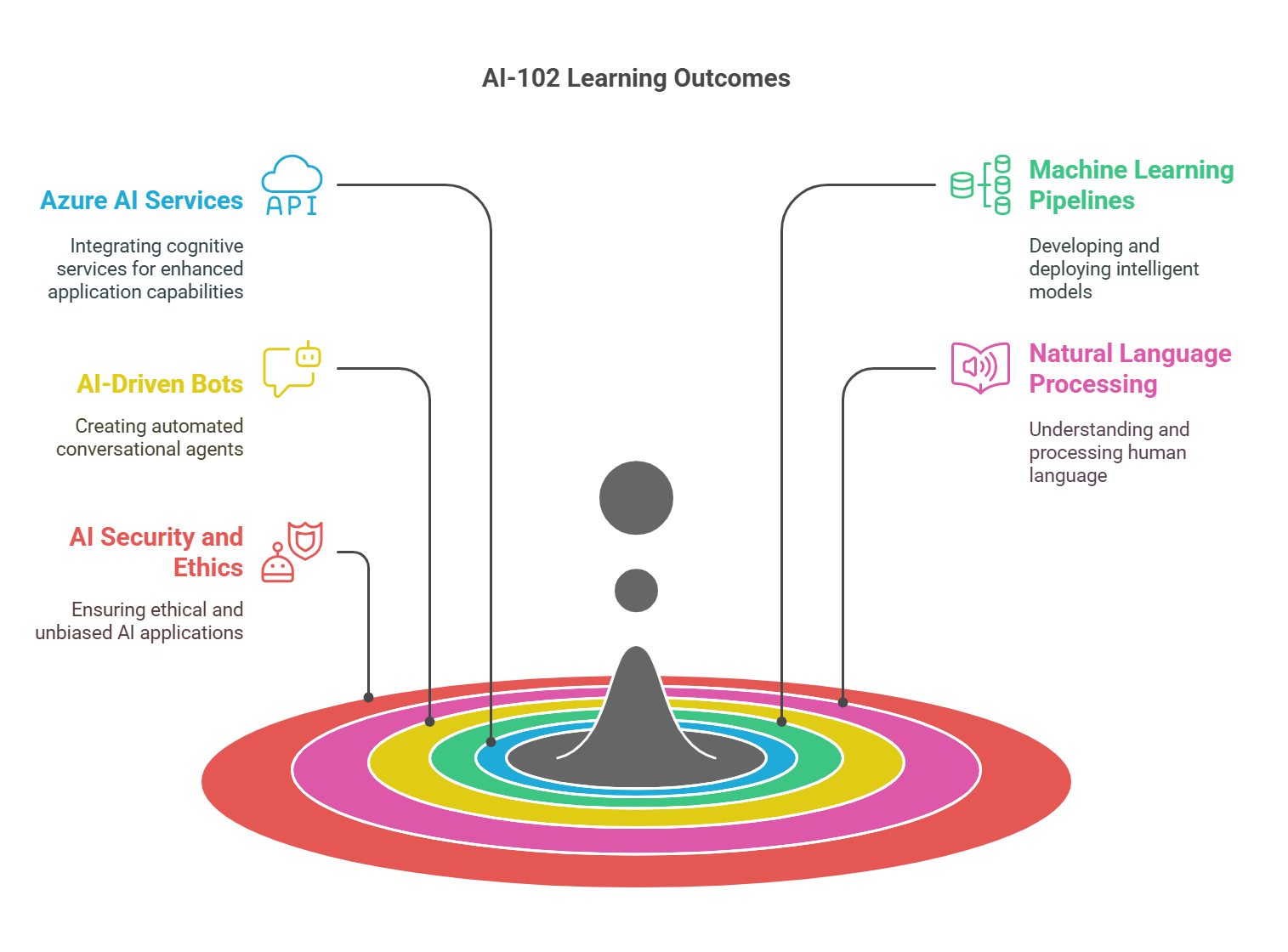
Who Should Get AI-102?
AI-102 is the right choice if you want to work with AI technologies in the cloud. It’s best for:
- AI engineers – Those developing AI models and integrating them into Azure applications.
- Machine learning specialists – People who work with AI algorithms and data training.
- Developers – If you’re already building apps and want to add AI capabilities, this cert makes sense.
This cert isn’t for security professionals or cloud administrators unless they’re shifting toward AI engineering.
Why AI-102 Matters in the AI Boom
AI is expanding fast, and companies are hiring AI engineers to build smart applications. Want to explore more AI-focused paths beyond AI-102? Don’t miss our roundup of the Best Artificial Intelligence Certifications for 2026 from beginner-friendly to advanced AI career tracks.
AI-102 proves you know how to integrate AI into cloud solutions, which is a huge advantage in industries using AI for automation, decision-making, and analytics.
The Bottom Line
AI-102 is all about AI development and implementation. If your goal is to secure cloud environments, this isn’t the right cert. But if you want to build AI solutions and work with cutting-edge technology, AI-102 is a strong step forward.
AZ-500: Skills You’ll Gain in Azure Security
If you’re into cloud security, risk management, and keeping bad actors out of systems, AZ-500 is where you’ll pick up the skills that actually matter in real-world security jobs.
1. Cloud Security Strategies & Architecture
- Learn how to secure Azure environments from top to bottom; this means understanding security layers, network protection, and access controls.
- You’ll track threats using Microsoft Defender for Cloud, firewalls, and Azure security monitoring tools.
2. Threat Mitigation & Incident Response
- You’ll understand how hackers attack Azure systems and what security teams do to stop them.
- This includes learning how to detect, analyze, and respond to cyber threats using Azure Sentinel (SIEM), Defender for Identity, and threat intelligence services.
3. Identity & Access Management (IAM)
- Managing user access, permissions, and authentication with Azure Active Directory (Azure AD).
- Implementing multi-factor authentication (MFA), conditional access policies, and role-based access control (RBAC) to prevent unauthorized access.
4. Data Security & Encryption
- Encrypting and securing sensitive data in Azure Storage, Azure SQL, and Key Vault.
- Ensuring compliance with industry security standards like ISO 27001, NIST, GDPR.
5. Security Controls & Compliance
- Learning how to set up security policies and governance frameworks for Azure environments.
- Implementing Zero Trust architecture and following best practices to maintain cloud security standards.
If you see yourself working in cloud security, cybersecurity, or IT risk management, these skills are exactly what employers are looking for.
AI-102: Skills You’ll Gain in AI Development
On the other side, AI-102 is all about building, deploying, and optimizing AI solutions in Azure. If you’re drawn to AI, machine learning, and automation, this cert helps you master the skills needed to work in AI engineering.
1. Designing AI Models & Machine Learning Workflows
- You’ll learn how to train, evaluate, and deploy AI models using Azure Machine Learning (AML).
- Understanding supervised, unsupervised, and reinforcement learning techniques to build AI-powered applications.
2. Working with Azure AI Services
- Mastering Azure Cognitive Services to add vision, speech, language, and decision-making AI into apps.
- Using Azure AI services for face recognition, speech-to-text, and text analytics.
3. Natural Language Processing (NLP) & Conversational AI
- Learning how to create AI chatbots and virtual assistants with Azure Bot Services and Language Understanding (LUIS).
- Implementing NLP models to make AI solutions understand and process human language.
4. AI Integration with Cloud Applications
- Embedding AI solutions into Azure-based applications using APIs and cloud-based AI models.
- Handling data ingestion, model deployment, and automation for AI-driven solutions.
5. AI Security, Responsible AI & Ethics
- Understanding how to secure AI models and ensure compliance with AI ethics and fairness policies.
- Managing AI bias, transparency, and risk in machine learning models.
If your goal is to work in AI development, machine learning, or AI-driven cloud applications, AI-102 is the better choice.
How Salaries Stack Up for Security vs. AI Professionals
AZ-500 and AI-102 lead to two very different career paths, and that affects how much you can earn. Let’s break it down.
AZ-500 Salary – What Security Experts Make
Looking to prep smarter for your security cert? AZ-500 Exam Dumps by Cert Empire offer realistic, updated practice questions to sharpen your skills fast.
Security is a top priority for companies using cloud platforms like Azure. A single security breach can cost millions, so skilled professionals who can lock down cloud environments and prevent cyberattacks get paid well.
Here’s what AZ-500 certified professionals typically earn:
- Azure Security Engineer – $110,000 to $145,000 per year
- Cloud Security Consultant – $120,000 to $160,000 per year
- Cybersecurity Architect – $130,000 to $175,000 per year
- Security Operations (SecOps) Analyst – $90,000 to $130,000 per year
Security roles usually offer stable salaries because every company needs cybersecurity, no matter the industry. Large enterprises and financial institutions often pay the most since they handle sensitive data and must follow strict compliance rules.
AI-102 Salary – What AI Engineers Earn
AI is booming, and companies are willing to pay top dollar for experts who can build and deploy AI solutions in Azure. The demand for AI professionals is growing faster than many traditional IT roles, which means high salaries for skilled engineers.
Typical AI-102 salaries look like this:
- AI Engineer – $120,000 to $160,000 per year
- Machine Learning Specialist – $130,000 to $170,000 per year
- Azure AI Solution Architect – $140,000 to $180,000 per year
- Data Scientist (AI Focused) – $110,000 to $150,000 per year
Since AI skills are specialized and in high demand, salaries are often higher than security roles. However, AI jobs can be more competitive, requiring strong programming, machine learning, and data analytics experience alongside the cert.
Ready to master AI-102? AI-102 Exam Dumps by Cert Empire are a great way to reinforce your learning with scenario-based practice that mirrors the real exam.
Which Certification Provides Long-Term Salary Growth?
If we’re looking at salary growth over time, both certs have strong earning potential, but they grow in different ways:
- AZ-500 leads to steady salary increases as security professionals gain experience and move into senior security roles (e.g., Cloud Security Architect, CISO).
- AI-102 salaries can skyrocket if you specialize in machine learning, deep learning, or AI research, but growth depends on staying up to date with new AI trends.
Final Verdict: Which Pays More?
- AI-102 leads to higher salaries on average, especially for experienced AI engineers.
- AZ-500 provides more stable job opportunities and steady salary growth over time.
- If you want high earning potential but are okay with a more competitive field, go with AI-102.
- If you prefer job security, steady salary increases, and strong demand across industries, AZ-500 is a safer bet.
Your final choice should depend on what excites you more, building AI solutions or securing cloud environments.
For a detailed breakdown of domains, exam structure, and real-world skills, see our AZ-500 Certification Azure Security Engineer Guide.
Career Opportunities: Where Can These Certifications Take You?
Picking between AZ-500 and AI-102 isn’t just about what you learn—it’s about where it takes your career. Both certs open doors to high-paying jobs, but they lead to very different industries.
If you’re wondering which one has better long-term career potential, let’s break down the job roles, market demand, and future outlook for both.
AZ-500 Career Paths – Where Security Experts Work
Cybersecurity is a critical function for any company using cloud services, which means AZ-500 opens doors to a variety of security-focused roles. These jobs focus on keeping Azure environments safe, preventing cyber threats, and managing cloud security policies.
1. Cybersecurity Specialist
- Monitors security threats, vulnerabilities, and risks in cloud environments.
- Works with tools like Microsoft Defender for Cloud, Azure Sentinel, and Security Center to analyze and stop cyberattacks.
- Average salary: $90K – $130K per year
2. Cloud Security Engineer
- Designs and implements security controls, encryption strategies, and access management policies for cloud-based systems.
- Works on incident response, security automation, and compliance to protect enterprise cloud infrastructure.
- Average salary: $110K – $145K per year
3. Cloud Security Architect
- Develops security frameworks and policies for Azure cloud systems.
- Responsible for designing secure cloud architectures and working with compliance teams.
- Typically requires 5+ years of experience in security.
- Average salary: $130K – $175K per year
4. Security Consultant
- Advises organizations on best security practices, risk assessment, and compliance.
- Works on penetration testing, threat analysis, and security audits.
- Average salary: $120K – $160K per year
5. SecOps Analyst (Security Operations Center – SOC)
- Monitors live security events, detects anomalies, and responds to security incidents.
- Works with SIEM tools, log analysis, and threat detection systems.
- Average salary: $90K – $130K per year
Why AZ-500 Career Paths Are In Demand
- Cloud security is a top priority for businesses – No company wants a data breach.
- Growing need for security compliance experts – With stricter regulations (GDPR, ISO 27001, HIPAA), companies need specialists who understand cloud security governance.
- Cyber threats are increasing – The demand for cloud security professionals continues to grow, and job security is high.
AI-102 Career Paths – Where AI Engineers Work
AI-102 leads to AI-driven development roles, where professionals build, train, and deploy AI solutions using Azure services. The jobs in this field focus on AI models, machine learning algorithms, and cognitive computing.
1. AI Developer
- Builds AI-powered applications using Azure Cognitive Services for vision, speech, and language processing.
- Works with Azure Machine Learning (AML), AI APIs, and automation frameworks.
- Average salary: $120K – $160K per year
2. Machine Learning Engineer
- Designs, trains, and deploys ML models in Azure for AI-driven applications.
- Works with Python, TensorFlow, and Azure AI pipelines to improve AI performance.
- Average salary: $130K – $170K per year
3. AI Solutions Architect
- Leads AI development projects, helping companies integrate AI into their products and services.
- Designs end-to-end AI workflows, from data ingestion to model deployment.
- Requires strong knowledge of both AI engineering and cloud infrastructure.
- Average salary: $140K – $180K per year
4. Data Scientist (AI Focused)
- Analyzes large datasets to train AI models and optimize predictive analytics.
- Uses Azure Machine Learning and data science techniques to improve AI accuracy.
- Average salary: $110K – $150K per year
5. AI Research Engineer
- Focuses on developing new AI technologies rather than just implementing existing ones.
- Works with deep learning, NLP, and AI model optimization.
- Average salary: $140K – $190K per year
Why AI-102 Career Paths Are in Demand
- AI adoption is growing fast – Companies want AI-driven automation and smart analytics.
- Demand for AI engineers outpaces supply – Businesses struggle to find skilled AI professionals.
- Higher salary potential – AI specialists tend to earn more than cybersecurity professionals, but competition is tougher.
If you’re still at the fundamentals stage, our AZ-500 vs AZ-900 certification comparison will help you decide whether to start with basics or dive straight into security.
Job Market Trends – Security vs AI: Which Field Has More Growth?
Both cloud security and AI engineering are high-growth career paths, but they grow in different ways.
Cloud Security (AZ-500) – Demand is Constant
- Security is a must-have – Every company with cloud infrastructure needs security professionals.
- Job stability is high – Cybersecurity will always be a priority, so demand isn’t going anywhere.
- Lower competition compared to AI – While security requires expertise, it’s not as competitive as AI engineering.
AI Engineering (AI-102) – Explosive Growth, But More Competitive
- AI is expanding rapidly – AI is reshaping industries like healthcare, finance, and automation.
- Higher salaries, but fewer job openings – AI roles pay more, but not every company has AI-focused teams.
- Requires strong programming and data skills – AI jobs demand more specialized knowledge, so competition is fierce.
Long-Term Outlook:
- AZ-500 provides long-term job security – Cybersecurity is a core need for companies, so job availability stays strong.
- AI-102 has higher salary growth potential – AI engineers earn more, but jobs are more competitive and require ongoing learning.
Which Certification is Better for Career Growth?
The best cert depends on your career goals.
- If you want job security, steady career growth, and high demand across industries, AZ-500 is the safer option.
- If you want higher salaries, cutting-edge tech, and don’t mind competition, AI-102 is worth pursuing.
Both fields are growing, but AI-102 leads to more specialized, high-paying jobs, while AZ-500 offers stability and long-term career security.
Still unsure whether to choose security or development? Our AZ-500 vs AZ-204 certification comparison breaks down how these two paths differ in skills, roles, and salaries.
Final Thoughts – Which Cert is Right for You?
Choosing between AZ-500 and AI-102 comes down to what excites you more—defending cloud systems or building AI-powered applications. If you’re drawn to cybersecurity, threat protection, and securing cloud environments, AZ-500 is the right move. But if you’re more interested in machine learning, AI solutions, and automation, AI-102 is the better fit.
No matter which cert you choose, preparation is key. If you want real exam questions to practice and increase your chances of passing on the first try, Cert Empire is a trusted source for AZ-500 and AI-102 exam prep materials. Get the right study resources and take the next step toward a rewarding career in cloud security or AI development.
Cert Empire is a top-rated provider of accurate and up-to-date practice materials for both AZ-500 and AI-102. Thousands of professionals trust it to pass their exams on the first try.
FAQs
Is AZ-500 better than AI-102 for a cloud security career?
Yes, AZ-500 is the best choice if you want to work in cloud security. It focuses on threat protection, identity management, and compliance, which are essential for security roles. AI-102, on the other hand, is more about developing AI-powered applications, not security.
Can AI professionals benefit from AZ-500 certification?
AI engineers don’t need AZ-500, but understanding security is a plus, especially if they work with sensitive AI data or cloud-based AI solutions. If your AI projects require strong security measures, AZ-500 could give you an edge.
Is AI-102 worth it if I don’t have an AI background?
AI-102 is beginner-friendly, but it helps if you have some coding experience (Python, C#) and knowledge of cloud computing. If you’re serious about AI development, this cert is a great starting point, but you’ll need to build your AI and machine learning skills alongside it.
Which certification has a better job market in 2026?
Both are in demand, but in different ways. AZ-500 offers stable job opportunities because cybersecurity is a must-have for every company. AI-102 has higher salary potential, but AI roles are more competitive and specialized. Security jobs are more widely available, while AI jobs tend to be higher paying but harder to land.
How do AZ-500 and AI-102 compare in terms of renewal and validity?
Both certs require renewal every year, but the renewal process is free and done online through Microsoft’s assessment. Microsoft constantly updates its certs to match industry trends, so expect content changes over time.
Does Microsoft recommend taking both AZ-500 and AI-102 together?
Microsoft doesn’t require both, but having security + AI knowledge can be a huge advantage in AI security roles. If you want to specialize in securing AI applications and handling cloud security for AI-driven systems, both certs could complement each other well.

